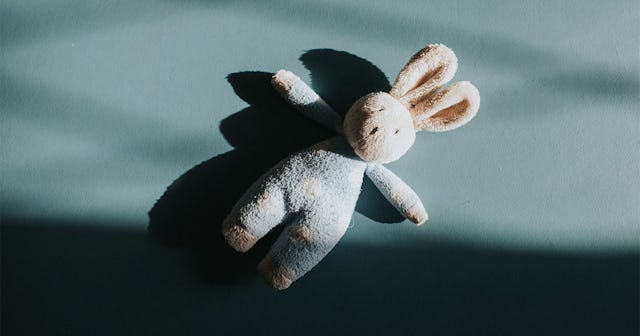When We Talk About Adoption, We Have To Recognize The Loss
When we over-romanticize adoption, we ignore the fact that, at its very core, adoption can involve loss.

People often think of adoption in very fairy-tale terms. And this makes sense – because when you get to build your family with a perfectly swaddled bundle or a one-tooth-missing first grader or, really, any child at all, it is absolutely wondrous. But when we over-romanticize adoption, we ignore the fact that, at its very core, adoption involves extreme loss.
It is seductive to view adoption as a facile “happily ever after.” But, like Nancy Verrier, adoption expert and author of “The Primal Wound: Understanding the Adopted Child,” says, when a child is “separated from his mother and handed … over to strangers, he could be profoundly affected by the experience.” By denying our child’s reality, often a complex and traumatic one, we are manipulating the adoption narrative into what we would like it to be, rather than what it is.
When, after so many months of waiting, I was able to hold my sons for the first time, it really was nothing less than magical. Our oldest arrived from Korea on September 7, 2003, and we saw him for the first time at O’Hare’s arrival terminal. The international adoption chaperone held him out in my direction; my mother instinctively reached for him. And I reacted by elbowing her in the gut – to make sure my perfect butterball ended up in my arms before anyone else’s. I wanted to be the first to smell him, to squish him, to be drooled on by him, to look close-range into his beautiful eyes.
Our second son arrived on June 7, 2005, but this time we were stuck in unexpected airport traffic, and I could see his plane taxiing. When we pulled up close enough to an entrance, I dive-rolled out of the car and then barreled through the crowd, hobbling anyone in my path. There was no way in hell I was going to be anything but the first to meet and touch and slather my infant son with kisses. Almost as soon as I snaked through and pushed in front of all other bystanders, his chaperone placed my perfect, Don-King-haired lovebug in my arms. And the angels sang.
I’ve always cherished the fact that I got to repeat the victorious mama bear ritual with each boy. No one, NO ONE, was going to have skin-to-skin contact with either boy before his “forever mom.” I was ignoring the facts, though. I may have loved and dreamt of these boys long before I knew of their existence, but I didn’t even enter their orbit until they were months old, and I was not their first “mother.” They had nested in the bodies of their birth mothers, and then, according to South Korean custom, both boys left the hospital to live with their foster mother and foster family.
We had originally chosen China as the country we would adopt from – but the South Korean adoption agency’s assurance that our oldest son would not be placed in a modern-day orphanage swayed us. We were reassured that there was a family committed to loving and caring for our child until he was allowed to leave the country and travel to us. We never anticipated that there could be any minuses inherent in this system or that it could, in a sense, add to an already-established history of loss.
In the words of Verrier, “The lack of a permanent caregiver deprives the child of some of the requisites for normal psychological development – a continuity of relationship, emotional nurturing, and stimulation. As the number of caregivers increases, the ability to attach diminishes…” [my emphasis].
This idea is still difficult for me to get my head around. We chose a South Korean adoption expressly because of the foster family–a care arrangement that was easily preferable to a sterile group home. But imagine this: by the time our sons physically joined our family, they would have had — and lost — a total of four mothers. Long before their first birthdays.
Of course, I wasn’t going anywhere, but how are two infants, who had already experienced the trauma of separation twice, expected to know that? And, even if they had somehow sensed that I would force my love on them for a lifetime, my future steadfastness could in no way undo the loss of the past.
And loss has repercussions. Psychology Today reports that adoptees may ”struggle with psychological disorders, behavioral challenges, or a sense of ‘not belonging’ that can negatively affect their mental state.” The North American Council on Adoptable Children compares the lingering effects of loss to those of post-traumatic stress disorder. According to contributor Jae Ran Kim, adoptees may experience difficulty with seemingly minor disruptions to routine, a pervasive feeling of hopelessness, and “psychic paralysis … when asked to make a choice.”
And this applies even to children who have been adopted as infants.
If I had thought about adoption in these terms (and I definitely did not), it would not have been a deterrent in any way. After all, one of the main reasons that we chose to adopt versus commingling our ovum and sperm was because of my dicey mental health history and the worry that a future child would inherit my wiring. I knew adoption was the only way I wanted to grow our family. And so, with the arrival of my two perfect sons, my fairy tale narrative was complete.
But what about their adoption narrative? If I had thought long and hard about the trauma inherent in my sons’ loss, I expect I would have been a more empathetic mother. I would have understood them more. And, most of all, I wouldn’t have annexed them, assuming from the get-go that they were mine, mine, mine.
This article was originally published on